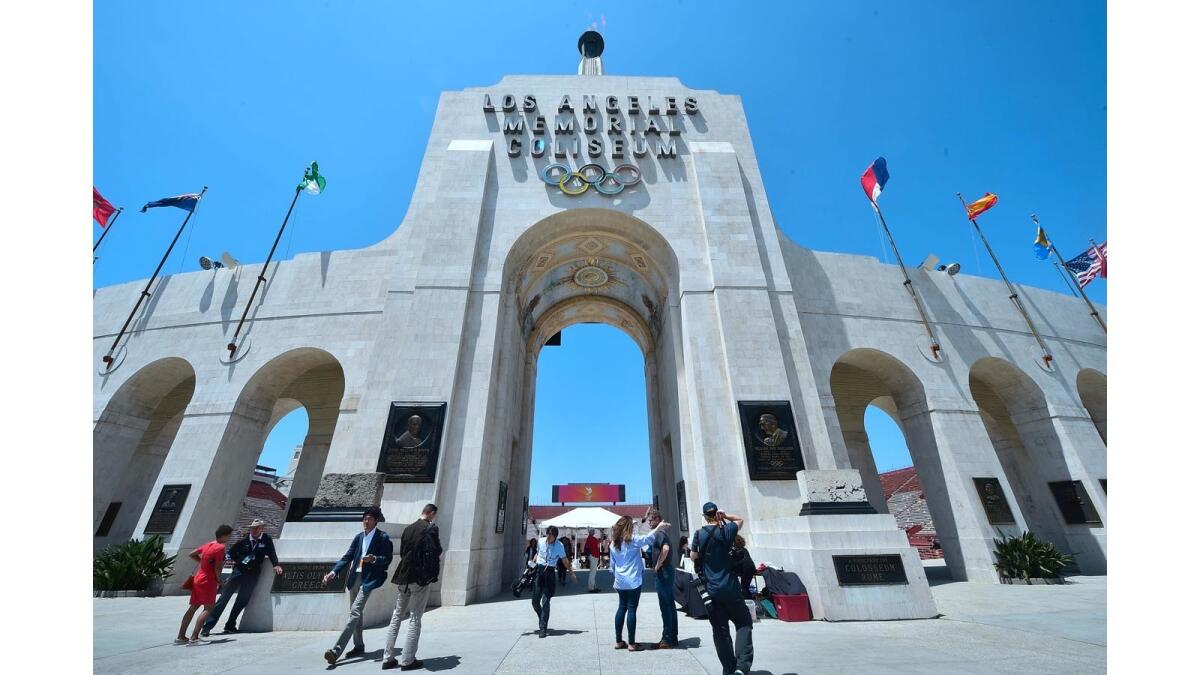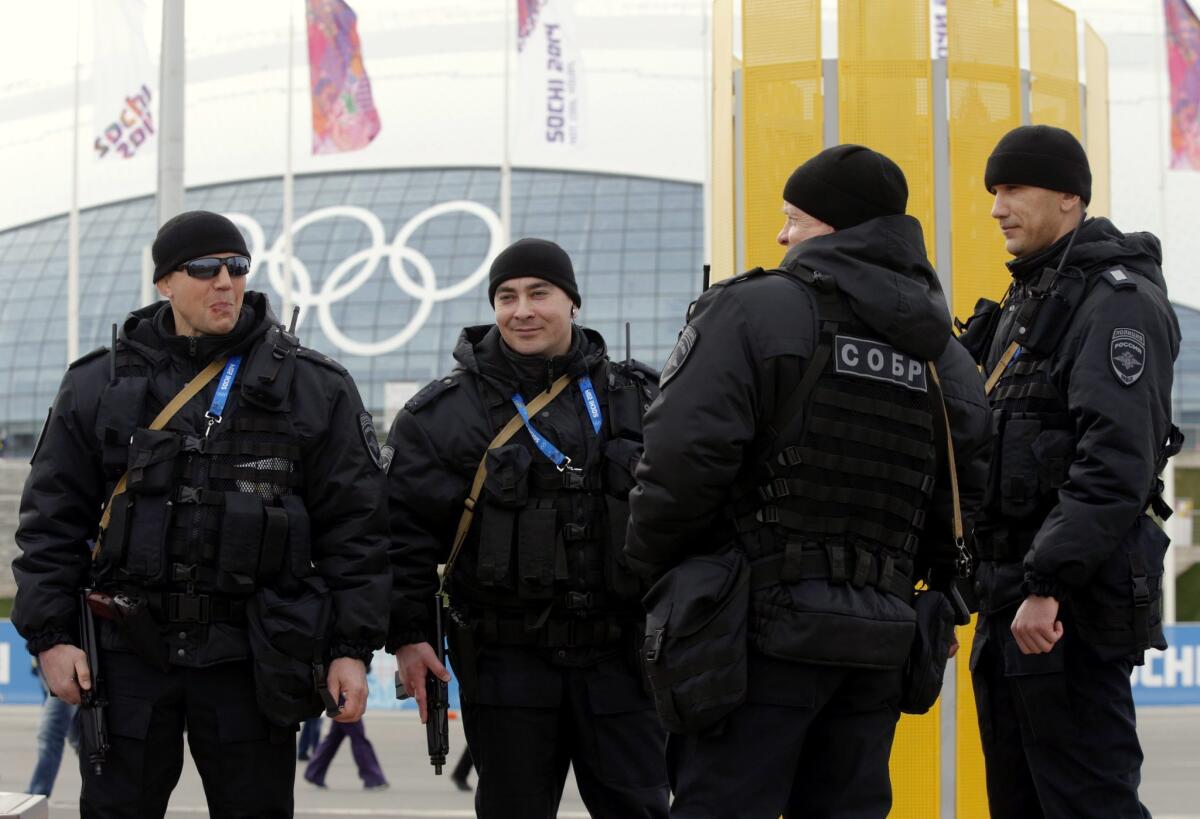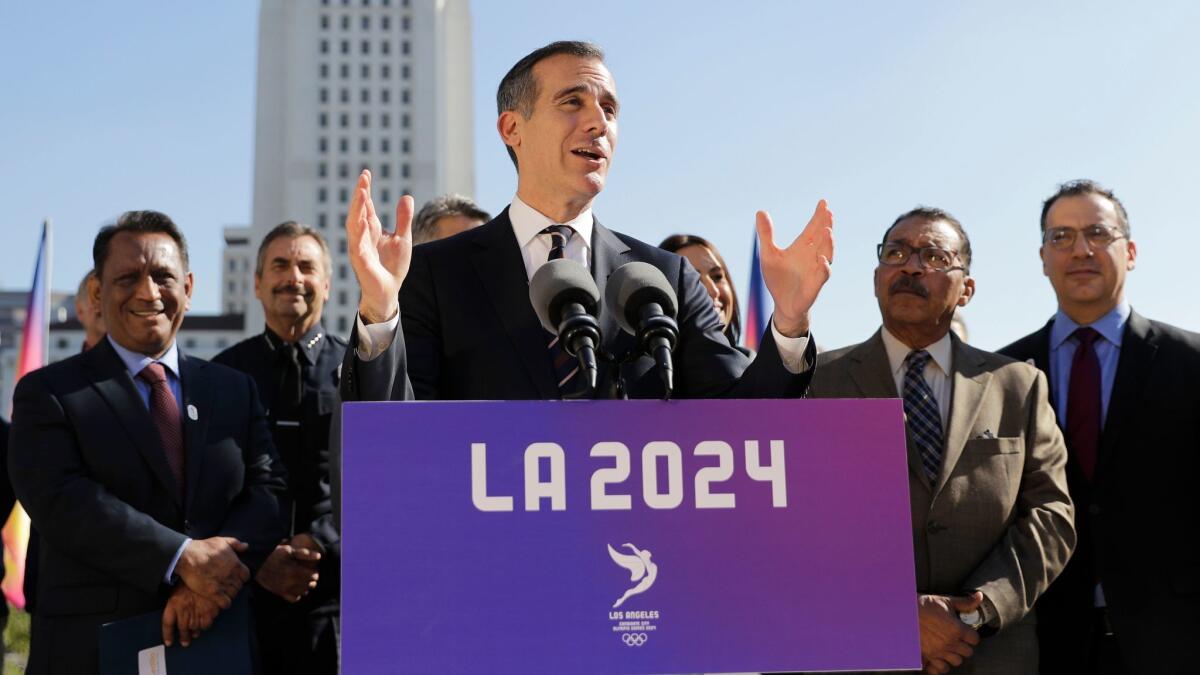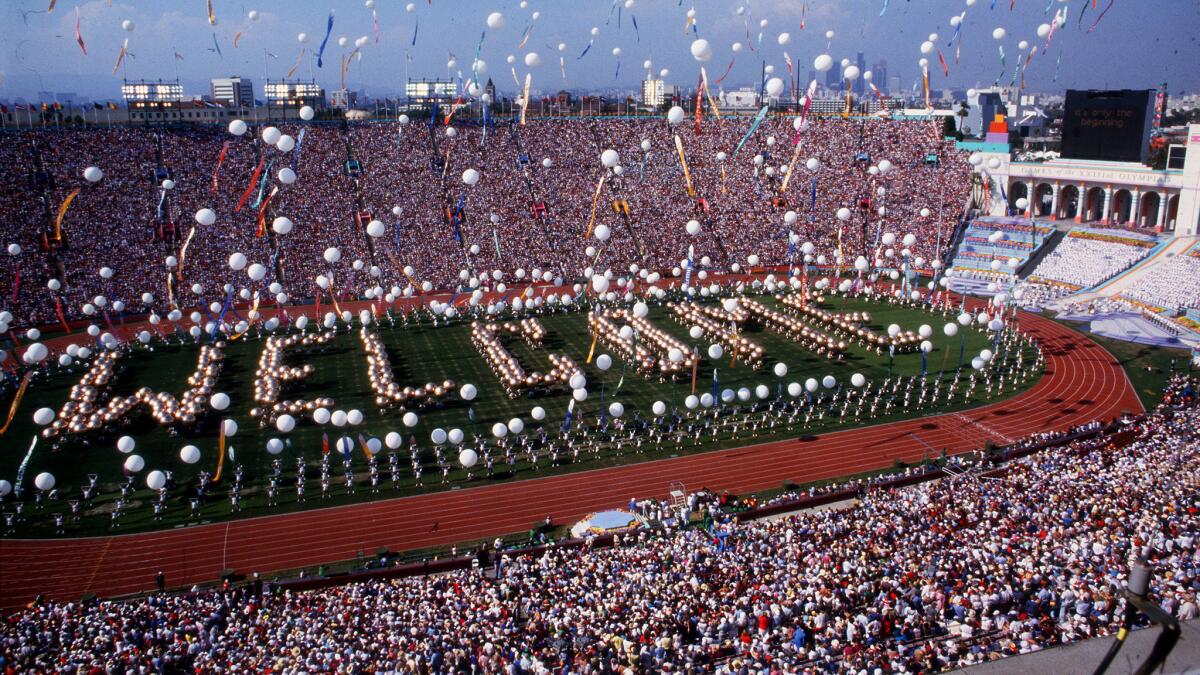Terrorists, hackers and scammers: Many enemies as L.A. plans Olympics security

- Share via
During the 1984 Summer Olympics, Charles Beck was a young Los Angeles police sergeant assigned to patrol the Athletes Village at UCLA and the Coliseum.
There was a lot of security, the now-chief recalled, along with police helicopters patrolling by air and bomb squads on hand.
But the nearest thing to high technology was an electronic badge system: 4 x 5 identity cards for athletes, dignitaries and journalists that gave them access to secure facilities during the games.
Come the 2028 Olympic Games, technology will play a much more central role in protecting the games. Modern-day defense isn't about a show of force as much as detection, prevention and disruption, Beck and others said.

MANY POTENTIAL ENEMIES
Terrorists, hackers and more
In the evolving world of terrorism and other threats, a keyboard, a drone or a computer virus could be as deadly as a gun, they say.
The potential targets have also evolved — not just main venues but "soft targets" where people gather. And violence is just one scenario the 2028 security team will have to consider. Another is hacking.
"It is tough to say," Beck said of the threats 11 years from now. "I would imagine by that time cybersecurity is going to be all encompassing."
Beck said he expects the traditional threats of explosives, guns and other deadly weapons would remain, but a new generation of terror and sabotage will likely evolve.
"It will be the financial security of the Games, the financial security of the city, the protection of infrastructure from hackers," Beck said.

LOGISTICAL CHALLENGE
Intelligence just as important as force
With the Games set to be declared a national special security event, the federal government, through the Secret Service, will lead the multiple-agency law enforcement effort.
Beck said the approach is going to be vital because of the vast numbers of personnel needed over so many weeks.
"The Los Angeles Police Department cannot grow appreciably in 10 years even if the city was funded enough and had the political will to do it … maybe 11,000 or 12,000 [officers] by then," said the chief of the nearly 10,000-officer agency.
"Getting enough personnel deployed for security for the Games will be big," he said. "It is going to require a lot of partnerships."
Beck said his job is to build the foundation for his successors by strengthening the department, community relations and partnerships with other Southern California law enforcement agencies.
Mike Downing, former deputy chief of counterterrorism at the LAPD, said those agencies must not react to an attack like the 1996 Atlanta Olympics bombing but thwart it.
"It is great to have the firepower, but the prevention side of the equation is so much more important: good intelligence and good disruption," he said.
Downing, now executive vice president of security for Prevent Advisors who advises major venues, said that at the 1984 Olympics he sat atop a building at UCLA with night vision goggles. Today, the city can be blanketed with cameras aided by facial recognition technology.
"You can put them up and take them down, position them at all major points and use mesh networks to support them," he said.
BIG COSTS
Protecting Olympics could cost $2 billion
In bidding for the Games 11 years out, the cost and strategy of security is almost unpredictable, experts say. The 2024 estimate for L.A.'s Olympics bid was $2 billion, and that is expected to rise.
Brian Jenkins, senior advisor to Rand Corp.'s president and a top terrorism expert, said history has shown that it is hard to predict the future more than a decade forward, noting that the Arab Spring and its upheaval were not foreseen, nor was the influence of the Internet.
"Ten years out and you are in the entertainment business, not the analysis business," he cautioned. But he said weapons and tactics use tend to change more slowly.
The Islamic State probably won't be the threat it is now in 11 years, but "something else will and I assume it will be terrorist-based," Beck said.
Brian Levin, a terrorism expert and professor at Cal State San Bernardino, said the recent attacks in Paris, Nice, Manchester and London are forcing those securing the Olympics to reassess measures as terror groups ignore iconic targets and pick soft targets to maximize body count.
"It is one thing to protect the Olympic Village and the venues. But the open areas in the city are going to need protecting," he said. "Centennial Park in Atlanta, where the 1996 Olympic bombing occurred, was a soft target. Hardening the venue is no longer good enough."
With more than 700 square miles of urban sprawl, L.A. presents a unique challenge with venues vast distances apart, Levin said. That will require more eyes.
"Drones are the future of law enforcement," he said, especially in a metropolis like L.A., where they can relay real-time information to officers on the ground.
Jules Boykoff, a politics professor at Pacific University in Oregon who's written extensively about the the Olympics, said Olympics security has been shaped by a series of events: the 1972 terrorist attack at the Munich Games, the 1996 Atlanta bombing and the Sept. 11, 2001, terrorist attacks.
"9/11 changed the 2002 Salt Lake City Winter Games. Security costs went through the roof," Boykoff said.
He said that in Salt Lake City massive security resources on an unprecedented scale were deployed for the first time.
In May, a National Security Agency whistleblower filed a lawsuit alleging that the agency employed full surveillance on phones and the Internet in the region during the Games — doing what it does overseas to American citizens. The NSA denied the allegation.

COMMUNITY RELATIONS
How will minority communities fare?
Boykoff said the 1984 Games — with a more than $200-million profit — are remembered as a financial success. But he said it's also important to remember that crime crackdowns in advance of the Games also sowed concerns in L.A.'s black community.
"The Olympics tend to displace and make feel unwanted the poorest sections of the community," he said.
Beck, who spent years helping to push through reforms at the LAPD after the 1992 riots, said he didn't believe that tensions between the department and minority communities stemmed from the Olympics.
The chief said his experience of 1984 was a coming together. "Everybody living in the basin … felt a personal stake in showing the best of the city, showing the best of the Games."
ALSO
Six reasons to worry about the 2028 Olympics
L.A. is vying to host the Olympics in 11 years — but is hustling to meet a deadline next week
L.A. City Council endorses 2028 Olympics bid, accepting responsibility for any cost overruns
Sign up for Essential California
The most important California stories and recommendations in your inbox every morning.
You may occasionally receive promotional content from the Los Angeles Times.








